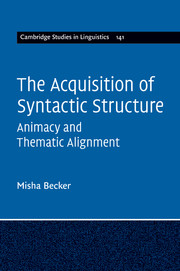Crossref Citations
This Book has been
cited by the following publications. This list is generated based on data provided by Crossref.
Becker, Misha
2015.
Animacy and the Acquisition ofToughAdjectives.
Language Acquisition,
Vol. 22,
Issue. 1,
p.
68.
Santos, Ana Lúcia
Gonçalves, Anabela
and
Hyams, Nina
2016.
Aspects of the acquisition of object control and ECM-Type verbs in European Portuguese.
Language Acquisition,
Vol. 23,
Issue. 3,
p.
199.
Choe, Jinsun
and
Deen, Kamil
2016.
Children’s difficulty with raising: A performance account.
Language Acquisition,
Vol. 23,
Issue. 2,
p.
112.
KANERO, JUNKO
HIRSH-PASEK, KATHY
and
MICHNICK GOLINKOFF, ROBERTA
2016.
Can a microwave heat up coffee? How English- and Japanese-speaking children choose subjects in lexical causative sentences.
Journal of Child Language,
Vol. 43,
Issue. 5,
p.
993.
Sullivan, Karen
and
Butler, Sally
2017.
Are dead artists’ paintings more lively? – Agency in descriptions of artworks before and after an artist’s death.
<i>WORD</i>,
Vol. 63,
Issue. 3,
p.
198.
Gardelle, Laure
and
Sorlin, Sandrine
2018.
Introduction.
International Journal of Language and Culture,
Vol. 5,
Issue. 2,
p.
133.
Ninio, Anat
2018.
Learning to produce complement predicates with shared semantic subjects.
First Language,
Vol. 38,
Issue. 4,
p.
399.
Bayanati, Shiva
and
Toivonen, Ida
2019.
Humans, Animals, Things and Animacy.
Open Linguistics,
Vol. 5,
Issue. 1,
p.
156.
Gotowski, Megan
2019.
The acquisition of theget-passive.
Language Acquisition,
Vol. 26,
Issue. 1,
p.
1.
Abraham, Werner
2020.
Modality in Syntax, Semantics and Pragmatics.
Pearl, Lisa S.
2021.
A Companion to Chomsky.
p.
267.
Pearl, Lisa
2021.
Theory and predictions for the development of morphology and syntax: A Universal Grammar + statistics approach.
Journal of Child Language,
Vol. 48,
Issue. 5,
p.
907.
PEARL, Lisa
2023.
Computational cognitive modeling for syntactic acquisition: Approaches that integrate information from multiple places.
Journal of Child Language,
Vol. 50,
Issue. 6,
p.
1353.
Syrett, Kristen
and
Becker, Misha
2024.
More hard words: Learning emotion and mental state adjectives from linguistic context.
Language Acquisition,
p.
1.





